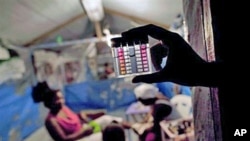A top United Nations health official say the cholera outbreak in Haiti has not been contained, and is yet to reach its peak.
The warning came Wednesday from Claire-Lise Chaignat, who heads the World Health Organization's cholera control task force.
The U.N. agency says more than 3,600 people have contracted cholera in Haiti, and as of late Tuesday, 284 have died from it.
The death rate is lower than it was when the outbreak began a week ago, but Chaignat says it is still far above what WHO considers normal.
Health officials' main goal now is to keep the outbreak from spreading south to the capital, Port-au-Prince, where hundreds of thousands of survivors of January's massive earthquake are living in crowded and unsanitary camps.
The outbreak has largely been confined to the Artibonite region of central Haiti.
WHO officials say they are providing powdered chlorine for water purification and testing water being distributed in settlement camps. The U.N. agency says the Haitian government has established a contingency plan to prevent the disease from spreading across the border into the Dominican Republic.
The border remains open, but Dominican authorities are stepping up security. They canceled a binational market normally held near the border this week.
Cholera, a bacterial infection, is spread by contaminated water, food and human waste. The disease is treatable but can kill within hours without treatment.
A contaminated river in the Artibonite region is the suspected source of the outbreak.
Some information for this report was provided by AFP.




